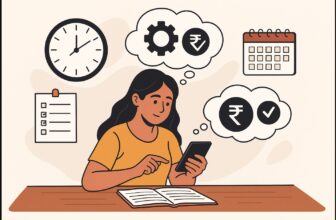Confidence is the key to success in every aspect of life—whether it’s acing a job interview, making a great first impression, speaking up in meetings, or simply feeling comfortable in your own skin. However, in India, where societal expectations, competition, and cultural norms often shape self-esteem, building confidence can feel like an uphill battle.
The good news? Confidence is not something you’re born with—it’s something you can develop. By understanding how your mind works and applying proven psychological strategies, you can instantly feel and appear more confident in any situation.
In this article, you’ll discover 9 science-backed psychological hacks that will help you boost your self-assurance, communicate with authority, and overcome self-doubt—whether you’re in a professional setting, social gathering, or personal challenge.
1. Reframe Negative Self-Talk
The narratives we tell ourselves significantly influence our confidence levels. Engaging in positive self-talk can transform your mindset and boost self-assurance.
How to Implement:
- Identify Negative Thoughts: Recognize self-defeating thoughts like “I’m not capable.”
- Challenge These Thoughts: Question their validity and consider evidence to the contrary.
- Replace with Positive Affirmations: Adopt empowering statements such as “I am improving every day.”
Example: Before a presentation, instead of thinking, “I’ll probably make mistakes,” tell yourself, “I have prepared thoroughly and will deliver effectively.”
When to Use: In situations where self-doubt arises, such as public speaking or taking on new responsibilities.
2. Adopt Confident Body Language
Your posture and gestures can influence both how others perceive you and how you feel about yourself.
How to Implement:
- Stand Tall: Keep your back straight and shoulders relaxed.
- Open Posture: Avoid crossing arms; maintain an open stance.
- Firm Handshake: This conveys confidence and professionalism.
Example: During meetings, sitting upright and making deliberate hand movements can project confidence.
When to Use: In professional settings, interviews, or social gatherings.
3. Set and Achieve Small Goals
Accomplishing small, manageable tasks can build momentum and enhance self-efficacy.
How to Implement:
- Define Clear Objectives: Break down larger goals into smaller, actionable steps.
- Celebrate Achievements: Acknowledge and reward yourself for completing tasks.
Example: If aiming to improve public speaking, start by presenting to a small group before addressing larger audiences.
When to Use: When embarking on new projects or developing new skills.
4. Visualize Success
Mental imagery can prepare you for real-life situations, reducing anxiety and boosting confidence.
How to Implement:
- Create a Vivid Image: Imagine yourself succeeding in specific scenarios.
- Engage All Senses: Consider sights, sounds, and feelings associated with success.
Example: Before a job interview, visualize confidently answering questions and connecting with the interviewer.
When to Use: Prior to events that induce nervousness, such as interviews or presentations.
5. Practice Mindfulness and Meditation
Mindfulness practices can ground you in the present moment, reducing anxiety about past or future events.
How to Implement:
- Daily Meditation: Dedicate time each day to focus on your breath and observe thoughts without judgment.
- Mindful Activities: Engage fully in routine tasks, paying attention to sensations and experiences.
Example: Incorporate yoga sessions that combine physical postures with mindful breathing to enhance overall well-being.
When to Use: Daily, or during stressful periods to maintain composure and clarity.
6. Engage in Regular Physical Activity
Exercise releases endorphins, which can improve mood and confidence.
How to Implement:
- Choose Enjoyable Activities: Whether it’s yoga, dancing, or jogging, select exercises you enjoy.
- Consistency: Aim for regular sessions, even if they’re short.
Example: Joining a local dance class can boost physical fitness and provide social interaction, enhancing confidence.
When to Use: Incorporate into your weekly routine for sustained benefits.
7. Dress in a Way That Empowers You
Your attire can influence your self-perception and how others perceive you.
How to Implement:
- Wear Well-Fitted Clothes: Ensure your clothing is comfortable and suits your body type.
- Choose Colors That Suit You: Select colors that complement your complexion and make you feel vibrant.
Example: Wearing traditional attire like a well-tailored kurta or saree during festivals can enhance cultural pride and confidence.
When to Use: In social events, professional settings, or whenever you wish to boost your self-esteem.
8. Maintain Eye Contact
Appropriate eye contact can convey confidence and help establish trust.
How to Implement:
- Practice in Conversations: Gradually increase eye contact duration in daily interactions.
- Be Mindful of Cultural Nuances: In India, excessive eye contact can be perceived as aggressive; aim for a balanced approach.
Example: During a business meeting, maintaining eye contact while speaking demonstrates confidence in your ideas.
When to Use: In one-on-one conversations, presentations, and networking events.
9. Seek Constructive Feedback
Building confidence isn’t about pretending to be someone you’re not—it’s about making small, practical changes in your mindset, body language, and daily habits that gradually strengthen your self-belief.
From adopting powerful body language to reframing self-doubt and practicing positive self-talk, these 9 psychological hacks can help you feel more capable, assertive, and self-assured in any situation.
- Start small—pick one or two strategies and apply them in real-life situations.
- Observe and learn from confident individuals in your workplace or social circle.
- Keep challenging yourself—every time you step out of your comfort zone, you build unshakable confidence.
By consistently practicing these techniques, you’ll not only feel more in control of your life but also gain the respect and trust of those around you. Confidence is a skill, and with the right mindset, you can master it!





